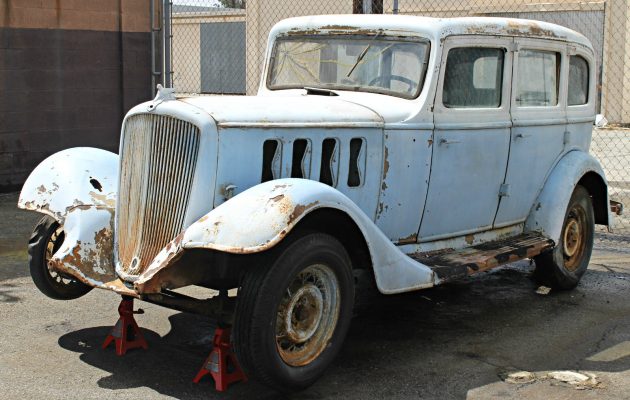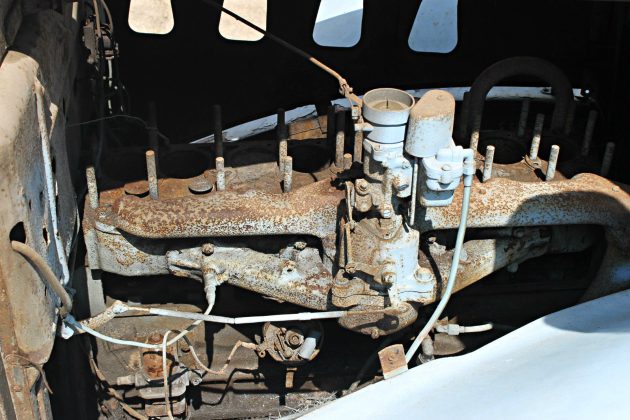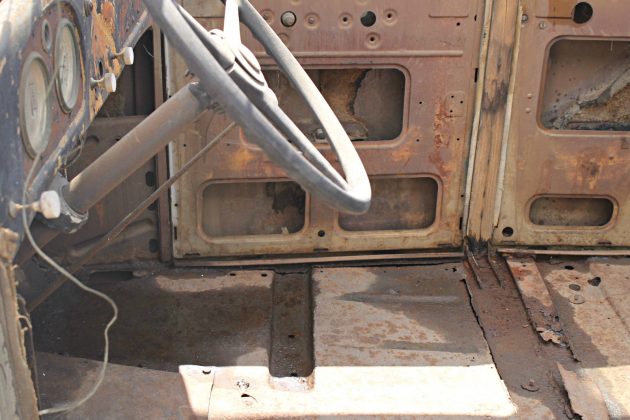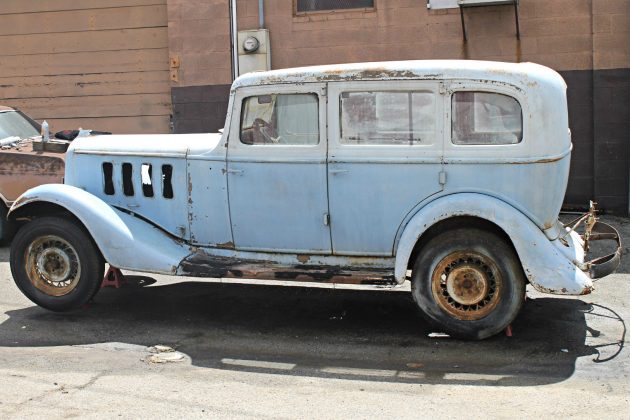Quick and nimble, the 1933 Hudson-Essex Terraplane was considered to be the automobile with the best power to weight ratio of 1933. Ameila Earhart christened the Terraplane in 1933 at a prosperity drive for the he manufacturer. Sleek, stylish, and powerful in the 8 cylinder variety, it is no wonder that Jon Dillinger chose the Terraplane as his “weapon of choice.” This 8 cylinder model hasn’t been a getaway car in many years, but this car has some promise. Despite missing its interior, and some other odds and ends, this great looking machine is currently bid up to $2,550. Find it here on eBay out of Orange, California.
Packing a 244 cubic inch inline 8 cylinder engine, this was the racing heart of Dillinger’s escapes. But how much power did this engine produce? A whopping 94 horsepower. Although compared to Fords 75 horsepower Flathead of the same era, it is easier to believe the Terraplane to be a getaway car. This particular engine looks to have been sleeping a long time, and someone at some point has puled the head. The nut and washers are missing from the head studs, and there is no information provided on the condition of the engine. Beyond the missing hardware, the engine seems relatively complete.
Within the cockpit is a vacant space that gives an idea of the condition of the body. There is surface rust throughout the entire vehicle, but there appears to be little in the way of rot. The floors seem surprisingly solid, as do the doors, and the rest of the body. There is some rot in the wooden “b pillar” but overall this Terraplane could be saved one way or another.
Someone took it upon themselves to spray bomb this classic, but I imagine it was done to prevent the spread of rust. There are areas where the paint is chipping revealing that some old, or possibly original, paint was still on the car. There is little to be seen as far as rust goes. There is surface rust in various areas, and the bottoms of the fenders look to be crispy. Beyond the fenders the rockers look nice, and the body work is quite straight, making it easy to see why someone saved this one. The Terraplanes have a great history, and stunning looks, when they are complete. Even Orville Wright decided he needed one of these fine automobiles, and the car the Ameila Earhart christened, was in fact Orvilles car. You can watch the christening as well as gain further information about the Terraplane by clicking here. The future for this particular car is unclear, but there is enough remaining to make use of this once very refined machine. Would you save this 1933 “speed demon?”









Full disclosure……I am not a Ford guy………..in its day the biggest thing Ford had going for it was cost…..it was cheep. Old Henry was one of the founders of Cadillac…….like Ross Perot, he was quickly run out of the company because he didn’t want to build quality cars, this Hudson has great style and is far superior to the period Ford products as were many other makes like Chrysler and even the lowly General Motors products. I have not researched the price New but I am sure it was maby twice that of the Ford. It has held up very well in the Southern California enviorment. Would be a wonderful project that will make a great car again. Hudson always had forward styling, the later cars mechanicals were unimpressive but this one is great all around.
Very well put Dave, I couldn’t agree with you more. Hopefully someone will see this car through our eyes, as it would be wonderful to see it resurrected.
You would have an easier time going back to 1933 and buying one new than finding parts for this vehicle. When I was young and my Dad thought HET was where it was at, these were rare. I’m retired now.
This car is actually an Essex-Terraplane. In ’34, Essex was dropped and it became simply Terraplane. In ’34 they also, for reasons I fail to understand, dropped the eight cylinder engine. Parts are really fairly easy to find through the HET club.
I thought v8 fords were Dillinger s choice for getaway cars. Or was that Clyde Barrow?
What a neat and challenging project vehicle from 1933. It’s interesting to see in this era of the automobile just how much design went into the ornate hood ornaments that defined in part the vehicles they adorned.